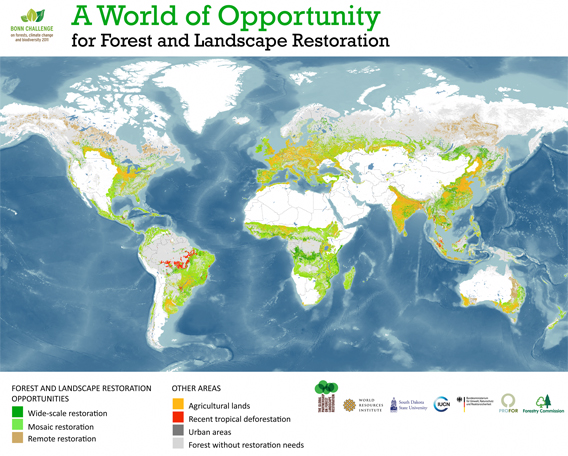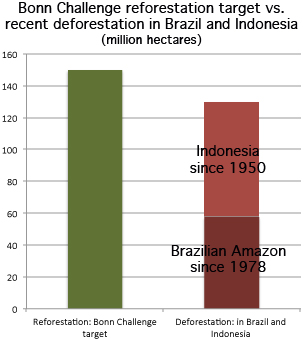
Global Partnership on Forest Landscape Restoration, World Resources Institute, South Dakota State University, International Union for Conservation of Nature. September, 2011. Larger version of the map
Conservationists and politicians meeting in Bonn on Friday launched a new initiative to restore 150 million hectares (580,000 square miles) of deforested and degraded forests, reports the World Resources Institute (WRI), an NGO that is involved in the effort.
Supporters say the target — dubbed the Bonn Challenge — could could boost economic growth while helping fight climate change.
“Restoring 150 million hectares of degraded lands represents an exciting and largely untapped opportunity to create more jobs and economic growth, while also protecting our climate,” said Göran Persson, a former Prime Minister of Sweden who will lead the New Global Restoration Council.
“Forest restoration is a big idea that carries many benefits. It will improve food security, enhance biodiversity, protect our climate, and generate jobs,” added Manish Bapna, interim President for WRI, in a statement. “With this new 150 million hectare target… we have a great opportunity to take action that will enhance the resilience of people and nature.”
 The Bonn Challenge reforestation target in comparison to recent deforestation in Brazil and Indonesia. Data sources include INPE for Brazil and Forest Watch Indonesia for Indonesia. |
WRI says the Bonn Challenge would help meet 2020 targets under the Convention on Biological Diversity (CBD) and the U.N. REDD+ program, which aims to reduce greenhouse gas emissions from deforestation and forest degradation.
The target represents just over 7 percent of the 2 billion hectares of land worldwide that are suitable for restoration, according to a recent estimate by a team of experts. The area, which is larger than South America, includes 1.5 billion hectares suited for “mosaic restoration”, which would include forests, farms, and settlements, and 500 million hectares suited for restoration of closed forests. Another 200 million hectares of boreal forest degraded by fire are unpopulated but would be difficult to restore, according to WRI.
Some 30 percent of global forest cover has been cleared in recent centuries, while another 20 percent has been degraded. Roughly one billion hectares of former forest lands are presently occupied by croplands and densely populated rural areas.
The new initiative won’t seek to take current agriculture lands out of production, but WRI says some of these lands “would benefit from having trees planted in strategic places to protect and enhance agricultural productivity and other ecosystem functions.”
The initiative’s supporters hope it will be adopted as an official target by the U.N., governments, and other institutions.
Related articles














